WITNESS RADIO MILESTONES
Freedom on the Net 2016
Published
7 years agoon
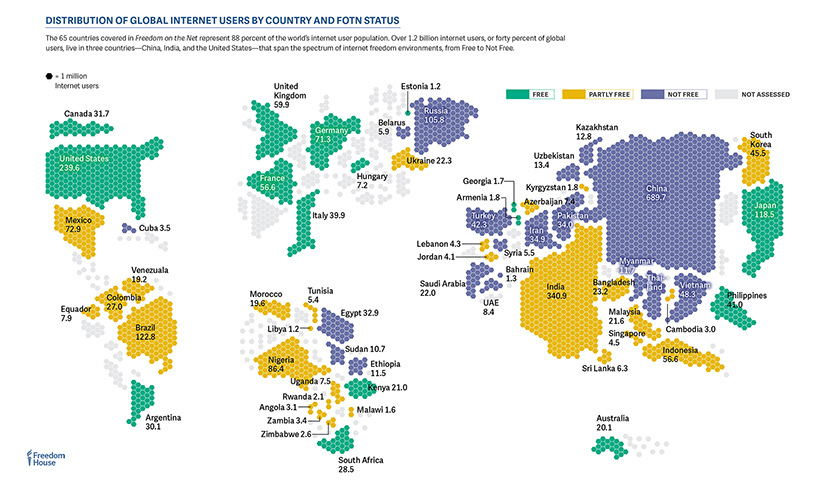
- Internet freedom around the world declined in 2016 for the sixth consecutive year.
- Two-thirds of all internet users – 67 percent – live in countries where criticism of the government, military, or ruling family are subject to censorship.
- Social media users face unprecedented penalties, as authorities in 38 countries made arrests based on social media posts over the past year. Globally, 27 percent of all internet users live in countries where people have been arrested for publishing, sharing, or merely “liking” content on Facebook.
- Governments are increasingly going after messaging apps like WhatsApp and Telegram, which can spread information quickly and securely.

by Sanja Kelly, Mai Truong, Adrian Shahbaz, and Madeline Earp
Internet freedom has declined for the sixth consecutive year, with more governments than ever before targeting social media and communication apps as a means of halting the rapid dissemination of information, particularly during anti-government protests.
Public-facing social media platforms like Facebook and Twitter have been subject to growing censorship for several years, but in a new trend, governments increasingly target voice communication and messaging apps such as WhatsApp and Telegram. These services are able to spread information and connect users quickly and securely, making it more difficult for authorities to control the information landscape or conduct surveillance.
Freedom on the Net 2016 Overall Scores
Freedom on the Net Score: 0=Most Free, 100=Less Free
Internet freedom has declined for the sixth consecutive year, with more governments than ever before targeting social media and communication apps as a means of halting the rapid dissemination of information, particularly during anti-government protests.
The increased controls show the importance of social media and online communication for advancing political freedom and social justice. It is no coincidence that the tools at the center of the current crackdown have been widely used to hold governments accountable and facilitate uncensored conversations. Authorities in several countries have even resorted to shutting down all internet access at politically contentious times, solely to prevent users from disseminating information through social media and communication apps, with untold social, commercial, and humanitarian consequences.
Some communication apps face restrictions due to their encryption features, which make it extremely difficult for authorities to obtain user data, even for the legitimate purposes of law enforcement and national security. Online voice and video calling apps like Skype have also come under pressure for more mundane reasons. They are now restricted in several countries to protect the revenue of national telecommunications firms, as users were turning to the new services instead of making calls through fixed-line or mobile telephony.

Other key trends
Social media users face unprecedented penalties: In addition to restricting access to social media and communication apps, state authorities more frequently imprison users for their posts and the content of their messages, creating a chilling effect among others who write on controversial topics. Users in some countries were put behind bars for simply “liking” offending material on Facebook, or for not denouncing critical messages sent to them by others. Offenses that led to arrests ranged from mocking the king’s pet dog in Thailand to “spreading atheism” in Saudi Arabia. The number of countries where such arrests occur has increased by over 50 percent since 2013.
Governments censor more diverse content: Governments have expanded censorship to cover a growing diversity of topics and online activities. Sites and pages through which people initiate digital petitions or calls for protests were censored in more countries than before, as were websites and online news outlets that promote the views of political opposition groups. Content and websites dealing with LGBTI (lesbian, gay, bisexual, transgender, and intersex) issues were also increasingly blocked or taken down on moral grounds. Censorship of images—as opposed to the written word—has intensified, likely due to the ease with which users can now share them, and the fact that they often serve as compelling evidence of official wrongdoing.

Security measures threaten free speech and privacy: In an effort to boost their national security and law enforcement powers, a number of governments have passed new laws that limit privacy and authorize broad surveillance. This trend was present in both democratic and nondemocratic countries, and often led to political debates about the extent to which governments should have backdoor access to encrypted communications. The most worrisome examples, however, were observed in authoritarian countries, where governments used antiterrorism laws to prosecute users for simply writing about democracy, religion, or human rights.
Online activism reaches new heights: The internet remained a key tool in the fight for better governance, human rights, and transparency. In over two-thirds of the countries in this study, internet-based activism has led to some sort of tangible outcome, from the defeat of a restrictive legislative proposal to the exposure of corruption through citizen journalism. During the year, for example, internet freedom activists in Nigeria helped thwart a bill that would have limited social media activity, while a WhatsApp group in Syria helped save innocent lives by warning civilians of impending air raids.

Tracking the global decline
Freedom on the Net is a comprehensive study of internet freedom in 65 countries around the globe, covering 88 percent of the world’s internet users. It tracks improvements and declines in governments’ policies and practices each year, and the countries included in the study are selected to represent diverse geographical regions and types of polity. This report, the seventh in its series, focuses on developments that occurred between June 2015 and May 2016, although some more recent events are included in individual country narratives. More than 70 researchers, nearly all based in the countries they analyzed, contributed to the project by examining laws and practices relevant to the internet, testing the accessibility of select websites, and interviewing a wide range of sources.
Of the 65 countries assessed, 34 have been on a negative trajectory since June 2015. The steepest declines were in Uganda, Bangladesh, Cambodia, Ecuador, and Libya. In Uganda, the government made a concerted effort to restrict internet freedom in the run-up to the presidential election and inauguration in the first half of 2016, blocking social media platforms and communication services such as Facebook, Twitter, and WhatsApp for several days. In Bangladesh, Islamist extremists claimed responsibility for the murders of a blogger and the founder of an LGBTI magazine with a community of online supporters. And Cambodia passed an overly broad telecommunications law that put the industry under government control, to the detriment of service providers and user privacy. Separately, Cambodian police arrested several people for their Facebook posts, including one about a border dispute with Vietnam.
China was the year’s worst abuser of internet freedom. The Chinese government’s crackdown on free expression under President Xi Jinping’s “information security” policy is taking its toll on the digital activists who have traditionally fought back against censorship and surveillance. Dozens of prosecutions related to online expression have increased self-censorship, as have legal restrictions introduced in 2015. A criminal law amendment added seven-year prison terms for spreading rumors on social media (a charge often used against those who criticize the authorities), while some users belonging to minority religious groups were imprisoned simply for watching religious videos on their mobile phones. The London-based magazine Economist and the Hong Kong–based South China Morning Post were newly blocked in mainland China, as were articles and commentaries about sensitive events including a deadly chemical blast in Tianjin in 2015.
Turkey and Brazil were downgraded in their internet freedom status. In Brazil, which slipped from Free to Partly Free, courts imposed temporary blocks on WhatsApp for its failure to turn over user data in criminal investigations, showing little respect for the principles of proportionality and necessity. Moreover, at least two bloggers were killed after reporting on local corruption. Turkey, whose internet freedom environment has been deteriorating for a number of years, dropped into the Not Free category amid multiple blockings of social media platforms and prosecutions of users, most often for offenses related to criticism of the authorities or religion. These restrictions continued to escalate following the failed coup in July 2016, in spite of the crucial role that social media and communication apps—most notably FaceTime—played in mobilizing citizens against the coup.
Just 14 countries registered overall improvements. In most cases, their gains were quite modest. Users in Zambia faced fewer restrictions on online content compared with the previous few years, when at least two critical news outlets were blocked. South Africa registered an improvement due to the success of online activists in using the internet to promote societal change and diversifying online content, rather than any positive government actions. Digital activism also flourished in Sri Lanka as censorship and rights violations continued to decline under President Maithripala Sirisena’s administration. And the United States registered a slight improvement to reflect the passage of the USA Freedom Act, which puts some limits on bulk collection of telecommunications metadata and establishes several other privacy protections.

Major developments
Social Media and Communication Tools Under Assault
In the past year, social media platforms, communication apps, and their users faced greater threats than ever before in an apparent backlash against growing citizen engagement, particularly during politically sensitive times. Of the 65 countries assessed, governments in 24 impeded access to social media and communication tools, up from 15 the previous year. Governments in 15 countries temporarily shut down access to the entire internet or mobile phone networks, sometimes solely to prevent users from disseminating information through social media. Meanwhile, the crackdown on users for their activities on social media or messaging apps reached new heights as arrests and punishments intensified.

New restrictions on messaging apps and internet-based calls
In a new development, the most routinely targeted tools this year were instant messaging and calling platforms, with restrictions often imposed during times of protests or due to national security concerns. Governments singled out these apps for blocking due to two important features: encryption, which protects the content of users’ communications from interception, and text or audiovisual calling functions, which have eroded the business model and profit margins of traditional telecommunications companies.
Whatever the justification, restrictions on social media and internet-based communication tools threaten to infringe on users’ fundamental right to access the internet. In a landmark resolution passed in July 2016, the UN Human Rights Council condemned state-sponsored disruptions to internet access and the free flow of information online.
WhatsApp faced the most restrictions, with 12 out of 65 countries blocking the entire service or disabling certain features, affecting millions of its one billion users worldwide. Telegram, Viber, Facebook Messenger, LINE, IMO, and Google Hangouts were also regularly blocked. Ten countries restricted access to platforms that enable voice and video calling over the internet, such as Skype and FaceTime.
Nearly ubiquitous among internet and mobile phone users, these communication platforms have become essential to the way we connect with the world. Incidents of blocking have had far-reaching effects, preventing family members from checking in during a crisis, activists from documenting police abuses during a protest, and individuals from communicating affordably with social and professional contacts abroad.
While all users are adversely affected by restrictions, the harm is often disproportionately felt by marginalized communities and minority groups, who are more likely to be cut off from critical information sources and the ability to advocate for their rights. In the United Arab Emirates (UAE), for example, where migrant workers and other noncitizens make up 88 percent of the population, blocks on communication tools have made it difficult for these individuals to organize or seek support from their home countries.
App blocking aimed at protests, expressions of dissent
Authoritarian regimes most frequently restricted communication apps to prevent or quell antigovernment protests, as they have become indispensable for sharing information on demonstrations and organizing participants in real time. In Ethiopia, ongoing protests that began in November 2015 in response to the government’s marginalization of the Oromo people have been met with periodic blocks on services including WhatsApp, Facebook Messenger, and Twitter. In Bahrain, Telegram was blocked for several days around the anniversary of the February 14, 2011, “Day of Rage” protests, likely to quash any plans for renewed demonstrations.
In Bangladesh, the authorities ordered the blocking of platforms including Facebook Messenger, WhatsApp, and Viber to prevent potential protests following a Supreme Court ruling in November that upheld death sentences for two political leaders convicted of war crimes. The longest block lasted 22 days. In Uganda, officials directed internet service providers to block WhatsApp, Facebook, and Twitter for several days during the presidential election period in February 2016 and again in the run-up to the reelected incumbent’s inauguration in May. In both instances, the unprecedented blocking worked to silence citizens’ discontent with the president’s 30-year grip on power and their efforts to report on the ruling party’s notorious electoral intimidation tactics.
New security and encryption features also trigger blocking
Governments increasingly imposed restrictions on internet-based messaging and calling services due to their strong privacy and security features, which have attracted many users amid growing concerns about surveillance worldwide.
In many countries, individuals are using messaging apps as private social networks where they can enjoy greater freedom of expression than on more established, public-facing social networks such as Facebook and Twitter. New messaging and calling apps also provide greater anonymity than conventional voice and SMS services that can be tracked due to SIM-card registration requirements, and several offer end-to-end encryption that prevents wiretapping and interception.
Activists and human rights defenders in repressive countries protect their communications by convening on WhatsApp, Viber, and Telegram to share sensitive information, conduct advocacy campaigns, or organize protests. Journalists in Turkey, for example, have established new distribution networks for their reporting via group channels on WhatsApp to avert censorship.
The same security features that appeal to users of the new platforms have brought them into conflict with governments in both democratic and authoritarian countries. In Brazil in 2015 and 2016, regional courts ordered a block on WhatsApp three times after it failed to turn over encrypted communications to local authorities during criminal investigations. On all three occasions, WhatsApp’s parent company, Facebook, insisted that it did not have access to the information in question, since WhatsApp does not store the content of users’ communications. Nevertheless, the judges chose to penalize not just the company, but also Brazil’s 100 million WhatsApp users.
Authoritarian regimes targeted Telegram for its “secret chat” mode, which allows messages to self-delete after a period of time. The platform was blocked in China after the authorities learned of its popularity among human rights lawyers, joining a long list of other international communication apps that are unavailable to Chinese users. State-run news outlets in the country accused Telegram of aiding activists in “attacks on the [Communist] Party and government.” Iran also targeted Telegram, blocking it for a week in October 2015 when it refused to aid officials’ surveillance and censorship efforts. In May 2016, Iran’s Supreme Council on Cyberspace ordered Telegram to host all data on Iranian users inside the country or face blocking.
Market threats to national telecoms lead to backlash
Internet-based messaging and calling platforms faced increasing restrictions from governments seeking to protect their countries’ major state-owned or private telecommunications companies. Given the rising popularity of new communication services over the past decade, telecoms in some markets have become concerned about the future economic viability of their traditional text and voice services, particularly when the new competitors are not subject to the same regulatory obligations and fees.
Typically free to download, messaging platforms such as WhatsApp, Telegram, and Facebook Messenger have proliferated in emerging markets, where the advent of low-cost, internet-enabled mobile devices and smartphones have made sending messages, photos, and even videos via online tools much more affordable than traditional SMS, for which telecom carriers charge a variable rate per message. Indeed, app-based mobile messaging has surpassed SMS texting worldwide since at least 2013.
Similarly, Voice over Internet Protocol (VoIP) and internet-based video calling services such as Skype, Google Hangouts, and Apple’s FaceTime have significantly reduced the cost of real-time audio and visual communication for users, resulting in the decreased use of traditional phone services that charge by the minute. Though telecom companies still profit from the data used by internet-based platforms, continual improvements in network infrastructure have only made data plans cheaper, threatening to leave traditional voice and SMS services further behind.
One of the first market-related restrictions on internet-based communication services was imposed by the American telecommunications company AT&T in 2007, when it partnered with Apple to become the sole mobile provider for the first iPhone and subsequently banned VoIP applications that could make calls using a wireless data connection. Google’s Voice app was consequently rejected by the iPhone’s app store, and Skype developed a version of its platform that only allowed iPhone users to make calls when connected to a Wi-Fi network. Under pressure from the Federal Communications Commission (FCC), AT&T changed course in 2009, setting a positive precedent and providing users with more freedom to choose from a suite of services based on quality and affordability.
In the past year, restrictions to protect market interests escalated most prominently in the Middle East and North Africa. The UAE had been an early mover, requiring VoIP services to obtain a license to operate as a telecom provider and subsequently blocking both the voice and video calling features of Skype, WhatsApp, and Facebook Messenger in 2014, in an effort to protect the profits of state-owned telecom companies. Most recently, Snapchat’s calling function was disabled in April 2016. While circumvention tools such as virtual private networks (VPNs) were widely used to bypass the blocks, the government cracked down in July 2016, adopting amendments to the Cybercrime Law that penalize the “illegal” use of VPNs with temporary imprisonment, fines of between US$136,000 and US$545,000, or both.
Morocco’s telecommunications regulator issued a directive in January 2016 that suspended all internet calling services over mobile networks, citing previously unenforced licensing requirements under the 2004 telecommunications law. The order seemed heavily influenced by the UAE’s Etisalat, which purchased a majority stake in Maroc Telecom, the country’s largest operator, in 2014. In Egypt, where long-distance VoIP calls on Skype have been blocked since 2010, voice calling features on WhatsApp and Viber have reportedly been inaccessible since October 2015. The calling functions of popular platforms were also disabled in Saudi Arabia, while Apple has been forced to sell its iPhone in the kingdom without the built-in FaceTime app.
Pressure to regulate mobile communication services in the past year threatened to impede access to such platforms in other regions, particularly sub-Saharan Africa, where mobile internet use has been growing rapidly. In Kenya, Nigeria, South Africa, and Zimbabwe, private telecommunications companies lobbied governments to regulate internet-based messaging and voice calling platforms such as Skype and WhatsApp, citing concerns over their profits. Meanwhile, Ethiopia’s single telecommunications provider, state-owned EthioTelecom, announced plans in April 2016 to introduce a new pricing scheme for mobile users of popular communication applications. Companies in the European Union (EU) pushed EU officials throughout 2016 to regulate new communication services, calling for a “level playing field” that subjects messaging and calling platforms to the same regulatory framework, licensing fees, and law enforcement access requirements as traditional telecoms.
Social media users face unprecedented penalties
While many governments attempted to restrict access to social media and communication platforms, far more turned to traditional law enforcement methods to punish and deter users. Since June 2015, police in a remarkable 38 countries arrested individuals for their activities on social media[ME6] , compared with 21 countries where people were arrested for content published on news sites or blogs. The rising penetration of social networks in repressive societies has enabled discussion and information sharing on issues that governments deem sensitive, resulting in arrests of journalists, politicians, activists, and ordinary citizens who may not be aware that they are crossing redlines.

A Turkish man was handed a one-year suspended sentence for this meme juxtaposing President Reçep Tayyip Erdogan and a character from the Lord of the Rings films. In determining whether or not the image insulted the president, the judge assembled a panel of film experts. Another user is facing up to two years in prison for reposting the same memes.
Dramatic sentences for social media ‘crimes’
Social media users were prosecuted for a range of alleged crimes during the coverage period. Some supposed offenses were quite petty, illustrating both the sensitivity of some regimes and the broad discretion given to police and prosecutors under applicable laws. Lebanon’s bureau of cybercrimes interrogated a Facebook user for criticizing a Lebanese singer, while soldiers in the UAE were arrested for disrespecting the army after they shared a video of themselves recreating a popular dance craze in their uniforms.
While severe punishments for online speech are not new, their application to social media activities that many people engage in daily was a cause for serious concern. In February 2016, a Saudi court sentenced an individual to 10 years in prison and 2,000 lashes for allegedly spreading atheism in 600 tweets. In the harshest examples of the coverage period, military courts in Thailand issued 60- and 56-year sentences in separate cases involving Facebook posts that were deemed critical of the monarchy in August 2015, though they were reduced to 30 and 28 years after the defendants pleaded guilty. While sentences like these may not cause people to stop using social media entirely, they are likely to encourage self-censorship on sensitive topics, robbing the technology of its potential for galvanizing social and political change.
Many detentions were justified under criminal laws penalizing defamation or insult, but they often aimed to suppress information in the public interest. In Morocco, YouTube footage of a man lifting asphalt barehanded from a local road led to his arrest for allegedly defaming the official responsible for the poor construction.
Users punished for their connections and readership
One goal of social media is to allow users to share content with a wide circle of connections. Police in some countries seem determined to undermine that goal, specifically pursuing individuals whose content goes viral. In Zimbabwe, Pastor Evan Mawarire was arrested in July 2016 after his YouTube videos criticizing the country’s leadership sparked the #ThisFlag social media campaign and inspired nationwide protests. Elsewhere, charges often multiplied as content was passed along: In November 2015, 17 people in Hungary were charged with defamation for sharing a Facebook post that questioned the legitimacy of the mayor of Siófok’s financial dealings.
In a disturbing development, defendants whose content failed to spread widely were nevertheless punished as a warning to others. In Russia, mechanical engineer Andrey Bubeyev was sentenced to two years in prison in May 2016 for reposting material that identified the Russian-occupied Crimean Peninsula as part of Ukraine on the social network VKontakte. He shared the information with just 12 contacts.
Authorities in other cases scoured social media for a pretext to charge specific individuals, or were so intent on suppressing certain content that identifying the correct defendant was of secondary importance. In Ethiopia, charges against an opposition politician and student protesters principally cited evidence gleaned from social media. Pseudonymous accounts offered limited protection and raised the risk of mistaken identity. A man in Uganda was charged on suspicion of operating the popular Facebook page Tom Voltaire Okwalinga, but he denied being responsible for the page, which frequently accused senior leaders of corruption and incompetence. Some people were held responsible for posts clearly made by others. At least three criminal charges were filed in India against the administrators of WhatsApp groups based on offensive or antireligious comments shared by other group members.
A number of users were apparently targeted only to punish their associates. In Thailand, Patnaree Chankij, the mother of an activist who opposes Thailand’s military government, was charged with insulting the monarchy based on a private, one-word acknowledgement she sent in reply to a Facebook Messenger post from her son’s friend; police said she failed to criticize or take action against the antiroyalist sentiment in the post, instead replying “yes” or “I see.” Patnaree told journalists that the charge was in reprisal for her son’s activities. In China, police detained the local relatives of at least three overseas journalists and bloggers who produce online content that the Chinese government perceives as critical.
Governments censor more diverse content
This year featured new trends in the type of content that attracted official censorship. Posts related to the LGBTI community, political opposition, digital activism, and satire resulted in blocking, takedowns, or arrests for the first time in many settings. Authorities also demonstrated an increasing wariness of the power of images on today’s internet.
A longer roster of forbidden topics
Related posts:

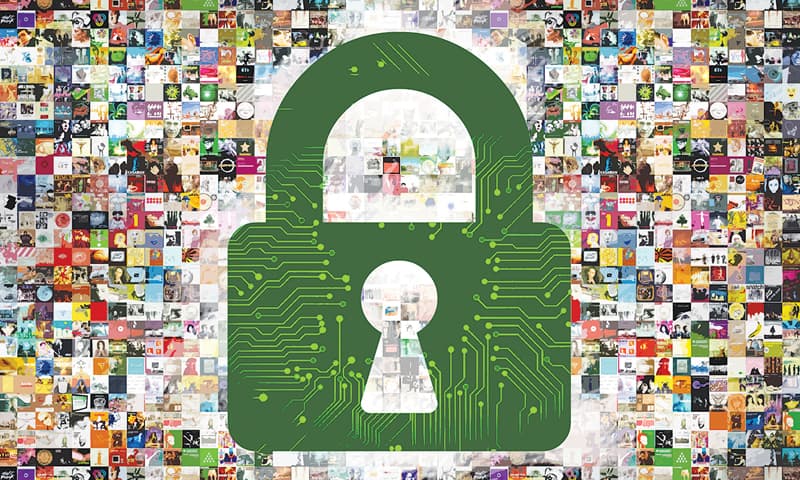 Internet shutdowns cost countries $2.4 billion last year
Internet shutdowns cost countries $2.4 billion last year
 Ugandan internet activist, legal team insists on constitutional interpretation
Ugandan internet activist, legal team insists on constitutional interpretation
 Three challenges for the web, according to its inventor
Three challenges for the web, according to its inventor
 Uganda declines on Internet freedoms Global Rankings – 2016 Freedom House Internet report
Uganda declines on Internet freedoms Global Rankings – 2016 Freedom House Internet report
You may like
DEFENDING LAND AND ENVIRONMENTAL RIGHTS
Breaking: Witness Radio and Partners to Launch Human Rights Monitoring, Documentation, and Advocacy Project Tomorrow.
Published
2 months agoon
February 21, 2024
By Witness Radio Team.
Witness Radio, in collaboration with Dan Church Aid (DCA) and the National Coalition for Human Rights Defenders (NCHRD), is set to launch the Monitoring, Documentation, and Advocacy for Human Rights in Uganda (MDA-HRU) project tomorrow, 22nd February 2024, at Kabalega Resort Hotel in Hoima District.
The project, funded by the European Union, aims to promote the protection and respect for human rights, and enable access to remedy where violations occur especially in the Mid-Western and Karamoja sub-regions where private sector actors are increasingly involved in land-based investments (LBIs) through improved documentation, and evidence-based advocacy.
The three-year project, which commenced in October 2023, focuses its activities in the Mid-Western sub-region, covering Bulisa, Hoima, Masindi, Kiryandongo, Kikuube, Kagadi, Kibale, and Mubende districts, and Karamoja sub-region, covering Moroto, Napak, Nakapiripirit, Amudat, Nabilatuk, Abim, Kaabong, Kotido, and Karenga districts.
The project targets individuals and groups at high risk of human rights violations, including Human Rights Defenders (HRDs) and Land and Environmental Defenders (LEDs). It also engages government duty bearers such as policymakers and implementers in relevant ministries and local governments, recognizing their crucial role in securing land and environmental rights. Additionally, the project involves officials from institutional duty bearers including the Uganda Human Rights Commission (UHRC), Equal Opportunities Commission, and courts, among others.
Representatives from the international community, faith leaders, and business actors are also included in the project’s scope, particularly those involved in land-based investments (LBIs) impacting the environment.
The project was initially launched in Moroto for the Karamoja region on the 19th of this month with the leadership of the National Coalition for Human Rights Defenders (NCHRD).
According to the project implementors, the action is organized into four activity packages aimed at; enhancing the capacity and skills of Human Rights Defenders (HRDs) and Land and Environmental Defenders (LEDs) in monitoring, documentation, reporting (MDR), and protection, establishing and reinforcing reporting and documentation mechanisms for advocacy and demand for corporate and government accountability; providing response and support to HRDs and marginalized communities; and lastly facilitating collaboration and multi-stakeholder engagements that link local and national issues to national and international frameworks and spaces.
Related posts:
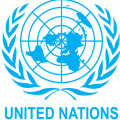
 Breaking: over 350,000 acres of land were grabbed during Witness Radio – Uganda’s seven months ban.
Breaking: over 350,000 acres of land were grabbed during Witness Radio – Uganda’s seven months ban.
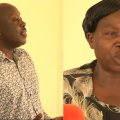 Kiryandongo leadership agree to partner with Witness Radio Uganda to end rampant forced land evictions in the district.
Kiryandongo leadership agree to partner with Witness Radio Uganda to end rampant forced land evictions in the district.
 Human Rights Defenders not safe in Uganda – Unwanted Witness report
Human Rights Defenders not safe in Uganda – Unwanted Witness report
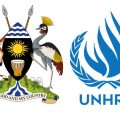 Breaking Alert: Uganda passes the National Action Plan (NAP) on Business and Human Rights
Breaking Alert: Uganda passes the National Action Plan (NAP) on Business and Human Rights
DEFENDING LAND AND ENVIRONMENTAL RIGHTS
Kiryandongo leadership agree to partner with Witness Radio Uganda to end rampant forced land evictions in the district.
Published
3 months agoon
January 4, 2024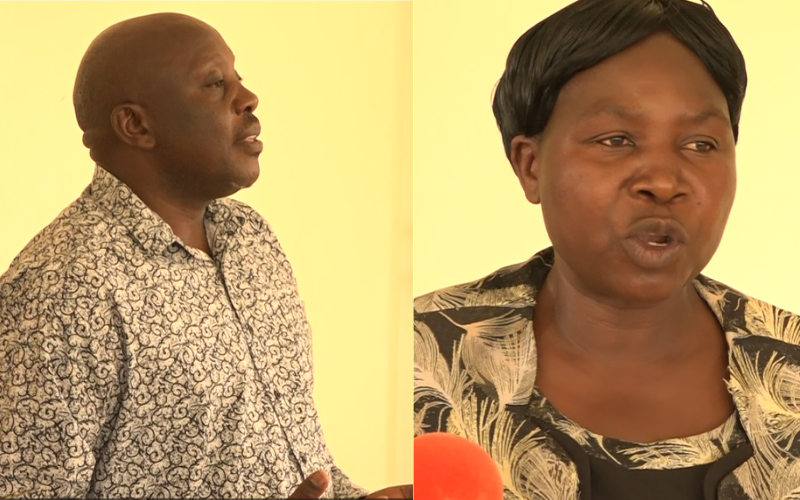
By Witness Radio team.
Kiryandongo district leaders have embraced Witness Radio’s collaboration with the Kiryandongo district aimed at ending the rampant violent and illegal land evictions that have significantly harmed the livelihoods of the local communities in the area.
The warm welcome was made at the dialogue organized by Witness Radio Uganda, Uganda’s leading land and environmental rights watchdog at the Kiryandongo district headquarters, intended to reflect on the plight of land and environmental rights defenders, local and indigenous communities and the role of responsible land-based investments in protecting people and the planet.
Speaking at the high-level dialogue, that was participated in by technical officers, policy implementers, religious leaders, leaders of project affected persons (PAPs), politicians, media, Civil Society Organizations (CSOs), and development partners that support land and environment rights as well as the Land Based Investments (LBIs) Companies in the Kiryandongo district, the leaders led by the District Local Council 5 Chairperson, Ms. Edith Aliguma Adyeri appreciated the efforts taken by Witness Radio organization to organize the dialogue meeting aimed at bringing together stakeholders to safeguard community land and environmental rights in order address the escalating vice of land grabbing in the area.
During the dialogue, participants shared harrowing accounts of the impacts of land evictions and environmental degradation, including tragic deaths, families torn asunder, young girls forced into marriage, a surge in teenage pregnancies, limited access to education, and significant environmental damage which have profoundly affected the lives of the local population in Kiryandongo.
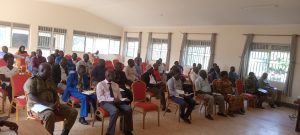
Participants attending the dialogue.
In recent years, Kiryandongo district has been embroiled in violent land evictions orchestrated to accommodate multinational large-scale agriculture plantations and wealthy individuals leaving the poor marginalized.
According to various reports, including findings from Witness Radio’s 2020 research Land Grabs at a Gun Point, the forceful land acquisitions in Kiryandongo have significantly impacted the livelihoods of local communities. It is estimated that nearly 40,000 individuals have been displaced from their land to make room for land-based investments in the Kiryandongo district. However, leaders in the district also revealed in the dialogue that women and children are affected most.
The Kiryandongo Deputy Resident District Commissioner, Mr. Jonathan Akweteireho, emphasized that all offices within the Kiryandongo district are actively involved in addressing the prevalent land conflicts. He also extended a welcome to Witness Radio, acknowledging their collaborative efforts in tackling and resolving land and environmental issues in the district.
“Ladies and gentlemen, we all know that the land rights together with environmental rights have been violated in our district, but because we don’t know what our rights are, because we have not directly done what we could to safeguard our rights and now this is the time that Witness Radio has brought us together to safeguard our rights. I want to welcome you in Kiryandongo and be rest assured that we shall give you all the necessary support to help us manage these rampant cases,” Ms. Adyeri said in her remarks during the dialogue meeting.
The team leader at Witness Radio Uganda, Mr. Geoffrey Wokulira Ssebaggala expressed gratitude to the participants for their active involvement in the dialogue and revealed that Witness Radio’s objective is to find a holistic solution to the escalating land disputes in Kiryandongo district serving as an example to other districts.
“We are here to assist Kiryandongo district in attaining peace and stability because it stands as a hotspot for land grabbers in Uganda. Mismanagement of land conflicts in Uganda could potentially lead to a significant internal conflict. Everywhere you turn, voices are lamenting the loss of their land and property. Kiryandongo, abundant with ranches, suffers from a lack of a structured framework, which amplifies these land conflicts. The influx of wealthy investors further complicates the situation,” Mr. Ssebaggala disclosed.
Within the dialogue, Mr. Ssebaggala emphasized the need for the Kiryandongo district council to pass a by-law aimed at curbing land evictions as an initial step in addressing the prevalent land injustices.
Related posts:

 Breaking: over 350,000 acres of land were grabbed during Witness Radio – Uganda’s seven months ban.
Breaking: over 350,000 acres of land were grabbed during Witness Radio – Uganda’s seven months ban.
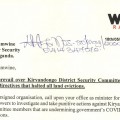 Why Are Evictions Still Happening In Kiryandongo: Witness Radio Petitions Government.
Why Are Evictions Still Happening In Kiryandongo: Witness Radio Petitions Government.
 Uganda: Targeting community land and environmental defenders with criminal offenses is rising as two community land rights defenders arrested in a hotspot district of forced land evictions.
Uganda: Targeting community land and environmental defenders with criminal offenses is rising as two community land rights defenders arrested in a hotspot district of forced land evictions.
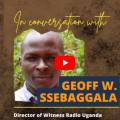 The Executive Director of Witness Radio Uganda talks about the role played by Witness Radio in protecting communities affected by large-scale agribusinesses in Kiryandongo district in an interview with the ILC.
The Executive Director of Witness Radio Uganda talks about the role played by Witness Radio in protecting communities affected by large-scale agribusinesses in Kiryandongo district in an interview with the ILC.
WITNESS RADIO MILESTONES
Kiryandongo authorities decry rising cases of land disputes
Published
4 months agoon
January 3, 2024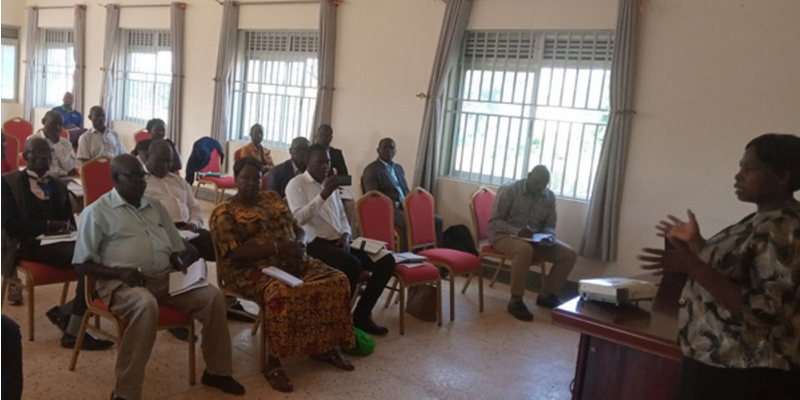
The LC5 chairperson of Kiryandongo, Ms Edith Aliguma Adyeri, has saidnland dispute has impacted on people’s lives, dignity and children’s education in the district.
Just like other parts of Uganda, conflicts over land in Kiryandongo arise when individuals – who often are blood relatives – compete for use of the same parcel of land or when members of the community lay claim over ownership of unutilised government land.
Ms Adyeri further said land and environmental rights affect people both directly and indirectly, “and we are not hearing it from afar. It is already together with us [here], it has already affected us!”
She was speaking at a meeting which sought to discuss alternative remedies to salvage the appalling land and environmental rights situation in Kiryandongo at the district headquarters on Thursday.
The one-day dialogue was aimed at reflecting on the plight of land and environmental rights defenders, local and indigenous communities and the role of responsible land-based investments in protecting people and the planet.
It was attended by private companies, members of civil society and local government officials and organised by Witness Radio – an advocate for land and environmental rights in Uganda – in partnership with Oxfam, and Kiryandongo District leadership.
“Some people have even died, families are broken up, and brothers are not seeing eye-to-eye because of land rights. Access to justice is equally becoming very difficult because when you hire one lawyer that
lawyer will talk to learned friends, and they agree. They leave you in suspense,” Ms Adyeri said.
According to her, some children have not accessed education because of land and environmental rights.
Mr Jonathan Akweteireho, the deputy Resident District Commissioner of Kiryandongo, said enlightened people especially should be sensitive to the historical injustice of this area.
“We can never handle the Bonyoro land question without thinking about that history. It will be an injustice to the incomers, to the government and to the leaders who don’t understand,” he said.
“We had 38 ranches here which on the guidance of these international organisations, especially the World Bank, the government restructured them, allowing people to settle there, they were never given titles and up to today, there are big problems in all those ranches,” he added.
Mr Jeff Wokulira Ssebaggala, the executive director of Witness Radio, said that a well-functional land sector supports land users or holders and investors, reduces inefficiencies and provides mechanisms to resolve land disputes.
Mr David Kyategeka, the secretary to the Kiryandongo District Land Board, said the issue of land rights is very clear but the major challenge has been sensitising the locals to know what rights he or she expects to enjoy out of this very important resource.
Source: www.monitor.co.ug
Related posts:

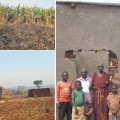 Witnessradio.org’s Petition to Land Inquiry Commission over Human rights in Kiryandongo district
Witnessradio.org’s Petition to Land Inquiry Commission over Human rights in Kiryandongo district
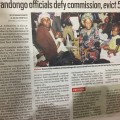 Kiryandongo District Authorities are on spot by the commission of inquiry into land matters
Kiryandongo District Authorities are on spot by the commission of inquiry into land matters
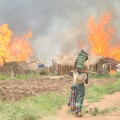 Land grabs victims in Uganda meet amid escalating cases of illegal evictions and rights violations
Land grabs victims in Uganda meet amid escalating cases of illegal evictions and rights violations
 Uganda: Targeting community land and environmental defenders with criminal offenses is rising as two community land rights defenders arrested in a hotspot district of forced land evictions.
Uganda: Targeting community land and environmental defenders with criminal offenses is rising as two community land rights defenders arrested in a hotspot district of forced land evictions.

Ugandan Activists Face Criminal Charges Following Pipeline Protest

Insurance firms should shun the East African Crude Oil Pipeline

How Kiryandongo land conflict has affected children

100 years of Total Energies – a dark legacy

Criminalization of planet, land, and environmental defenders in Uganda is on the increase as 2023 recorded the soaring number of attacks.

Protect family farming land to guarantee global food sovereignty and Climate change adaptation and mitigation – Global conference on Family Farming.

Food inflation: The math doesn’t add up without factoring in corporate power

Oil project-affected persons express disappointment in Uganda judiciary

Innovative Finance from Canada projects positive impact on local communities.
Over 5000 Indigenous Communities evicted in Kiryandongo District
Petition To Land Inquiry Commission Over Human Rights In Kiryandongo District
Invisible victims of Uganda Land Grabs
Resource Center
Legal Framework
READ BY CATEGORY
Newsletter
Trending
-
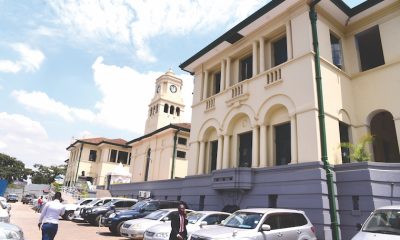
 MEDIA FOR CHANGE NETWORK2 weeks ago
MEDIA FOR CHANGE NETWORK2 weeks agoOil project-affected persons express disappointment in Uganda judiciary
-

 MEDIA FOR CHANGE NETWORK2 weeks ago
MEDIA FOR CHANGE NETWORK2 weeks agoChip in to take Bayer down!
-

 NGO WORK2 weeks ago
NGO WORK2 weeks ago100 years of Total Energies – a dark legacy
-
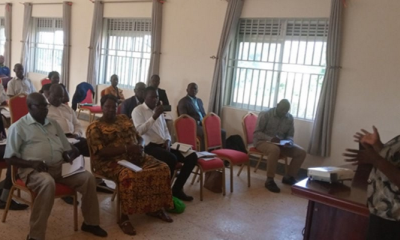
 MEDIA FOR CHANGE NETWORK1 week ago
MEDIA FOR CHANGE NETWORK1 week agoHow Kiryandongo land conflict has affected children
-
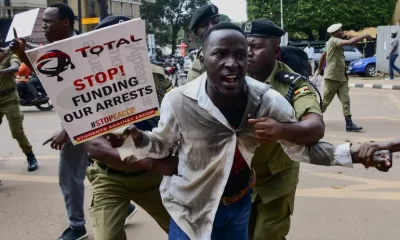
 MEDIA FOR CHANGE NETWORK21 hours ago
MEDIA FOR CHANGE NETWORK21 hours agoInsurance firms should shun the East African Crude Oil Pipeline
-
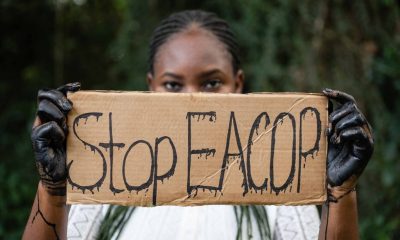
 MEDIA FOR CHANGE NETWORK21 hours ago
MEDIA FOR CHANGE NETWORK21 hours agoUgandan Activists Face Criminal Charges Following Pipeline Protest

